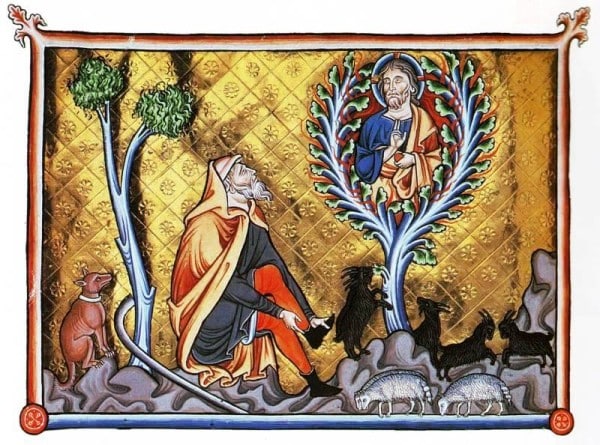STAY INFORMED
Must Watch Videos
Is the Angel of the Lord the Pre-Incarnate Christ?
The Church Fathers held an unwavering belief that the Second Person of the Trinity appeared frequently in the Old Testament in a variety of forms: the Angel of the Lord, the Burning Bush, the Son of Man, and the one like a Son of God in Daniel.
Today we’ll look at a debate regarding the Angel of the Lord. Is he or isn’t the Pre-Incarnate Son of God? There are various positions in early Christianity.
The Greek Church Fathers (for example, Saint Athanasius) are convinced that “the Angel of the Lord” is the pre-incarnate Christ. They posit that the Angel of the Lord is categorically different from lower angelic beings (as in the Epistle to the Hebrews) and use this distinction to refute Arian heretics that deny the deity of Christ.
We find the identity of the Angel of the Lord with the Pre-Incarnate Christ also in the early Latin Fathers, such as Saint Justin Martyr, Tertullian, Saint Hilary of Poitiers, and Ambrose.
Part of the problem is linguistic. In Hebrew, the word for angel isמלאך or “malak” and all it means is “messenger.” In Greek, the word ἄγγελος or “angelos” also means “messenger.” So the Angel of the Lord is the “Messenger of the Lord” and is God Himself.
Angel of the Lord in Latin
In Latin, the word is translated from Greek as “angelus” or angel or angelic being. In Greek, it’s not a problem. But in the Latin West there was a worry that identifying Christ as “the Angel of the Lord” would lead to Arianism since “angel” in Latin implies a lower created being. (By the way, Jehovah’s Witnesses make this very mistake!)
So we see by the time of Saint Augustine, the Latin Church is reading “Angel of the Lord” as merely a chief angelic being or generic theophany of God, and not as the Pre-Incarnate Christ.
Saint Ambrose believed the Angel of the Lord was the Pre-Incarnate Christ. Saint Augustine did not.
This is a shame. In my opinion, this interpretive shift with Augustine was a bad theological move.
Augustine does, however, grant that sometimes “Angel of the Lord” is a reference to the pre-Incarante Christ, such as at Isaiah 9:6 in the Septuagint, where Christ is called “Prince of Peace” and “Angel of Great Counsel” or μεγάλης βουλῆς ἄγγελος.
The Angel of the Lord as God
We can see in the opening books of the Bible that the “Angel/Messenger of the Lord” is divine and speaks as God and is recognized as God:
- In Genesis 16:7–14. The Angel/Messenger of the Lord speaks as God in the first person, and in verse 13 Hagar identifies “the LORD that spoke to her” as “Thou God sees me”.
- In Genesis 22:11–15. The Angel/Messenger of the Lord appears to Abraham and refers to God in the first person.
- In Genesis 31:11–13 the Angel/Messenger of God says, “I am the God of Bethel.”
- In Exodus 3:2–4. The Angel/Messenger of the Lord appears to Moses in a flame in verse 2, and God speaks to Moses from the flame in verse 4.
According to Saint Athanasius and Saint Hilary of Poitiers, in all these cases we have the Logos or Second Person of the Trinity acting as the Divine Word or Message to the people of God. If Christ is the Word of the Father, then we might expect Him functioning in the Old Testament as the Message or Messenger of God.
Irenaeus of Lyons also identifies the Angel/Messenger of the Lord with God the Son in Exodus 3:8:
And again, when the Son speaks to Moses, He says, I have come down to deliver this people.” Against Heresies III, 6.
Saint Hilary of Poitiers writes:
To discriminate clearly between the Persons, He is called the Angel of God; He Who is God from God is also the Angel of God, but, that He may have the honour which is His due, He is entitled also Lord and God. On the Trinity IV
Theodoret of Cyrus writes:
The whole passage (Exodus 3) shows that it was God who appeared to Moses. But Moses called Him an “angel” in order to let us know that it was not God the Father whom he saw — for whose angel could the Father be? — but the Only-begotten Son, the Angel of Great Counsel.”
I’m currently re-reading the Pentateuch and making notes along the way as I come across “the Angel of the Lord” language. It’s quite fun and remarkable. It certainly gives a robust Trinitarian feel to the Old Testament, something the Greek Church loved to boast in.
Update: As brought up in the comments below: Saint Thomas Aquinas argues that the “Angel of Sacrifice” of the Roman Canon’s Supplices is Christ Himself (STh III q. 83, a. 4, ad 9).
For more references to the Angel/Messenger of the Lord as the Pre-Incarnate Christ see also:
Justin Martyr, Dialogue with Trypho, 58, 59, 60, 61, 76, 86, 116, 126, 127, 128; Irenaeus, Against Heresies, 3.6.1-5, Fragments, 53; Tertullian, Against Praxeas, 16, De Carne, 14, Against Marcion 2.27, 3.9; Novatian, On the Trinity, 18, 19, 31; Apostolic Constitutions, 5.3.20; Clement of Alexandria, The Instructor, 1.7; Eusebius, The Proof of the Gospel, 1.5, 4.10, 5.10, Church History, 1.2.7-8, Preparation for the Gospel, VII. 5, 14-15; Origen, Contra Celsus, 5.53, 8.27; Methodious, Symposium, 3.4; Melito, New Fragments, 15; Ambrose, Exposition of the Christian Faith, 1.13.83; Athanasius, Against the Arians, 3.25.12-14; Gregory of Nyssa, Against Eunomius, 11.3.
[reminder]
Dive Deeper

GET CONFIDENT IN YOUR FAITH
Explore the fascinating world of Catholic teachings with Dr. Marshall. Together you’ll unpack the brilliant answers the Church gives to tough questions about the Faith. The best part: you go at your own pace. Start this exciting journey today.

